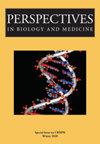如何应对组织错误中的共谋?
IF 0.7
4区 医学
Q2 HISTORY & PHILOSOPHY OF SCIENCE
引用次数: 0
摘要
尽管医疗保健机构的初衷是善意的,但它们往往会造成伤害。虽然有些伤害在经营过程中是不可避免的,而且可能在道德上是合理的,但其他伤害构成了组织错误,这是永远无法辩解的。当一个医疗保健提供组织行为不当时,组织的错误使每个员工都有责任减轻这些错误。本文探讨了个人责任与组织错误的关系问题,并提出了同谋个人可以采取的策略来减轻组织错误。本文章由计算机程序翻译,如有差异,请以英文原文为准。
What to Do About Complicity in Organizational Wrongs.
Despite their benevolent intent, health-care delivery organizations often cause harm. While some harms are unavoidable in the course of doing business- and are perhaps morally justified-other harms constitute organizational wrongs, which are never justifiable. When a health-care delivery organization acts wrongly, the organizational wrong imbues individual employees with a responsibility to mitigate those wrongs. This article explores the question of individual responsibility in relationship to organizational wrongs and proposes strategies that complicit individuals can adopt to mitigate organizational wrongs.
求助全文
通过发布文献求助,成功后即可免费获取论文全文。
去求助
来源期刊

Perspectives in Biology and Medicine
医学-科学史与科学哲学
CiteScore
1.40
自引率
20.00%
发文量
42
审稿时长
>12 weeks
期刊介绍:
Perspectives in Biology and Medicine, an interdisciplinary scholarly journal whose readers include biologists, physicians, students, and scholars, publishes essays that place important biological or medical subjects in broader scientific, social, or humanistic contexts. These essays span a wide range of subjects, from biomedical topics such as neurobiology, genetics, and evolution, to topics in ethics, history, philosophy, and medical education and practice. The editors encourage an informal style that has literary merit and that preserves the warmth, excitement, and color of the biological and medical sciences.
 求助内容:
求助内容: 应助结果提醒方式:
应助结果提醒方式:


